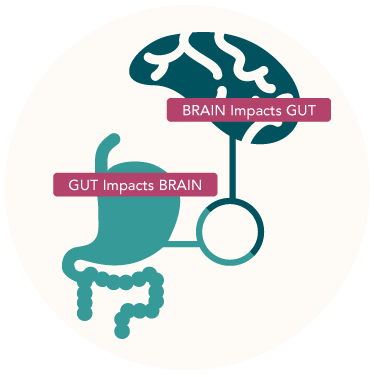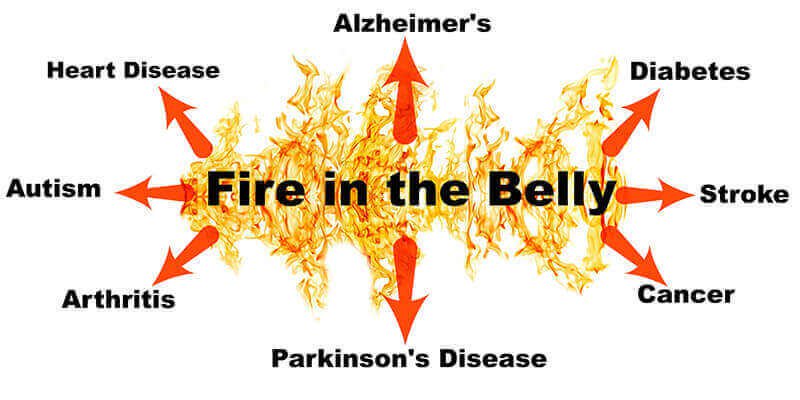There’s been a tidal wave of research pouring in from the likes of Harvard and Johns Hopkins Medicine revealing the quickest and most effective way to ease the symptoms of Autism may be through, what they’re calling, “the 2nd brain”… aka the “Gut.”
In Fact,
Recently, a review of over 150 papers on ASD and gut bacteria found scientists have been reporting links between bacteria in the gut and autistic behavior since 1960.
The review highlights several studies showing that restoring a healthy balance in gut bacteria can ease the symptoms of ASD.
Here are 3 reasons why…(In easy-to-understand English)
1. The Gut-Brain Axis
To begin to understand the mechanics of the research and why thousands of parents are already implementing strategies based on the studies…and seeing dramatic results…
It’s important to start with the dynamic communication between the gut and the brain.
Let me explain…
Have you ever felt nauseous before giving a speech?
Ever had a “gut feeling” not to do something?
Butterflies in your stomach when you get nervous?
How about experiencing your mood change when you devour the leftover mac n’ cheese?…(There’s a reason they call it “comfort food”).
Well,
That’s because there’s a direct line of communication from your gut to your brain…
Yes…
Your gut speaks to your brain (and vice versa).
The area in your gut responsible for communicating is known as your Enteric Nervous System (EDS).
“The enteric nervous system doesn’t seem capable of thought as we know it, but it communicates back and forth with our big brain—with profound results.”
Jay Pasricha, M.D., Director of the Johns Hopkins Center for Neurogastroenterology

In Fact,
The area of your brain that your gut communicates most with is responsible for…
- Mood
- Sociability
- Mental Health
- Human Connection
…and a host of other variables affected by ASD.
Interestingly enough, over 70% of people with Autism also have gastro problems and issues related to their gut.
Additionally,
“…many children with Autism have abnormal communities of digestive bacteria in their intestines. And some of these studies have associated specific types of gut bacteria with more-severe Autism symptoms.”
Paul Wang, Autism Speaks
2. Imbalance of Good and Bad Bacteria Causing a “Leaky Gut”
There’s been several studies conducted which have shown the majority of people with ASD have an imbalance of good and bad bacteria.
Specifically, more bad bacteria than good bacteria.
“Our initial work found major differences in the gut bacteria of children with Autism compared to typical children, and our subsequent work has confirmed those findings. Children with Autism seem to be missing hundreds of beneficial gut bacteria.”
Rosa Krajmalnik Brown – ASU Autism/Aspergers Research Program
The excess “bad bacteria” inevitably leads to the over-production of toxins which weakens the lining of the intestine, making it permeable…which leads to what’s known as Leaky Gut Syndrome.
Leaky Gut Syndrome is a term used to describe “Hyper-permeable Intestines” which simply means the intestinal lining (your guts’ filter) has holes in it, allowing toxins, yeast, undigested food, and other dangerous pathogens into your bloodstream.
The Effects?
Once the toxins, particles, and pathogens get into your bloodstream, it triggers the immune system to feel stress and danger.
As a response, the body goes into defense mode and becomes inflamed.
Which in turn puts pressure on the brain that intensifies (or creates) behaviors of ASD.
Does that make sense?
If not, read this section one more time…
If there’s nothing else you get from this,
If Autism is a Fire … INFLAMMATION is Gasoline.

Why?…
That question takes us to Reason #3.
3. Chronic Inflammation
One Arizona State University study revealed the results of chronic inflammation (long-term inflammation)… and the parallels to behaviors of ASD is shocking.
Here’s what they found happened with inflammation…
- Cell death in the brain and reduced brain cell formation. In other words, brain cells were dying, and fewer brain cells formed.
- Reducing the response and release of Oxytocin – Oxytocin is the hormone responsible for social interaction, love, human connection, etc.
- Repetitive behavior
- Hypersensitivities
- Movement and coordination issues
Do those results and symptoms sound familiar?
Here the kicker…
In the same study,
When they introduced PROBIOTICS (good healthy bacteria) and a non-inflammatory diet to the test subjects,
The inflammation went down, and virtually all the behaviors and symptoms improved dramatically, and in some cases even went away.
This is why it’s critical to…
- Reduce the inflammation inside of people with Autism.
- Avoid behavior and habits that cause inflammation.
Let’s Recap
- Your Gut directly communicates with your brain – if you have an unhealthy Gut, you’ll have an unhealthy brain.
- The majority of people with ASD have a bacteria imbalance in their gut which leads to toxins and pathogens entering their bloodstream. This creates a chronic inflammatory response inside the body.
- Inflammation puts pressure on the brain and intensifies (or creates) behaviors of ASD.
“Ok, I get it…so what can I do for my child?”
The easiest answer to help children with Autism…
Heal The Gut And Reduce Inflammation!
But Where Do You Start?
Well,
There are several specific adjustments that can and should be made to the daily nutrition of the person with ASD.
But it’s not completely mandatory…
In fact,
One of the easiest and simplest ways to heal the gut and reduce inflammation is to take a probiotic on a daily basis.
Unfortunately, not all probiotics are created equally.
There are specific ingredients and dosages that we found to be most effective and maximize results for children with Autism.
For example…
To help improve the sociability of a person with Autism, the probiotic must contain a healthy bacteria strain called “Lactobacillus Reuteri or L-Reuteri.”
Where Can I Get Quality Probiotics?
These days you can find a probiotic at any local mini-mart.
But beware of their safety, quality, and effectiveness.
It seems like every vitamin company has quickly thrown a few cheap ingredients together and magically … a “probiotic” appears on their list of products.
Look,
Just because there’s technically beef on a Big Mac, doesn’t mean it’s the same as the prime rib at a steakhouse.
The fact is,
There is a special blend of unique ingredients that must be combined to effectively help children with Autism.
Top 5 Things to Look for When Shopping for Probiotics…
There are six components to consider when determining whether you’re looking at a McDonalds’ probiotic, or a ‘fancy steakhouse’ probiotic designed specifically for children with Autism.
1. Strain Diversity and Strength
- Most probiotics contain 3 strains and 5 billion CFU’s (Colony-Forming Units).
- Children with Autism need a stronger and more diverse probiotic. Look for one with at least 10 strains and 10 billion CFU’s.
2. Look for a probiotic that contains a strain known as “L Reuteri”.
- This is a vital ingredient for children with Autism. In a recent study, researchers found that by feeding the probiotic Lactobacillus Reuteri to mice with autism-like behaviors, improved their sociability while increasing the number of oxytocin-producing neurons (a hormone associated with social behavior) in their brains.
- It also improved signs of brain plasticity – the brain’s ability to form new connections that foster learning.
3. Easy to Consume
- The probiotic can only work if the child consistently takes it on a daily basis. Look for the option of a flavorless powder that can be mixed into juice or smoothies so that your child can drink it and not even know it.
4. Research Shows that Healing the Lining of the Gut is Extremely Important in Reducing Inflammation. Most Probiotics Only Contain Strains of Good Bacteria, and Some May Even Have Prebiotics
- Be sure that the probiotic contains ingredients that help heal the gut lining, prebiotics, and digestive enzymes to help the body absorb nutrients.
5. Buy From Companies Who Believe in Their Products. The Way to Tell Who Truly Stands Behind Their Products is by Their Guarantee
- Most companies offer a 30 or 60-day money-back guarantee.
- The companies who genuinely believe in their product, its quality, and effectiveness offer 90-day money-back guarantee.
If you can find a probiotic that contains all 5 of those components, you’re going to be Golden.
Where Would I Begin to Find Quality Probiotics?
If you have a high-end Vitamin Boutique in your area, you can rummage around to see if they have something.
Or,
You can try a bottle of All-Star Nutrition’s Revolutionary 5-in-1 Bio-Heal Probiotic. I’ve tried almost every probiotic on the market, and Bio-Heal had the biggest effect of both myself and my son.
Click Here to Learn More About the Only Supplement Designed for Autism with 300+ Five-Star Reviews ⭐️⭐️⭐️⭐️⭐️.
And start healing the gut and reducing inflammation.
It contains all 5 critical components needed for children with Autism, and you can get a bottle for 20% OFF right now.

About Author: Marty Orefice
My son was diagnosed with Autism before the age of 3. The diagnosis was a shock to the family. After struggling with doctors and therapists, I knew there had to be a better way. After stumbling across an underground community called ‘Bio Hackers’, I started applying science, nutrition, and supplements to my son’s daily life. Within 30 days we started to notice massive changes in behavior and overall well-being. I know these strategies have helped my family and can help yours too!

Resources Used in Creating this Article:
General Gut-Brain Connection: http://www.johnshopkinshealthreview.com/issues/fall-winter-2015/articles/the-garden-in-your-guthttps://www.health.harvard.edu/diseases-and-conditions/the-gut-brain-connection
Gut microbe study shows promise as a potential treatment for autism https://asunow.asu.edu/20170123-discoveries-asu-gut-microbe-study-shows-promise-potential-treatment-autism
The Gut Microbiota and Autism Spectrum Disorders https://www.ncbi.nlm.nih.gov/pmc/articles/PMC5408485/
Can probiotics benefit children with autism spectrum disorders?https://www.ncbi.nlm.nih.gov/pmc/articles/PMC5155168/
Comprehensive Nutritional and Dietary Intervention for Autism Spectrum Disorder-A Randomized, Controlled 12-Month Trial https://www.ncbi.nlm.nih.gov/pubmed/29562612 (Full Text – http://www.mdpi.com/2072-6643/10/3/369)
Ketogenic diet versus gluten free casein free diet in autistic children: a case-control study. https://www.ncbi.nlm.nih.gov/pubmed/28808808
Gut microbiota’s effect on mental health: The gut-brain axis https://www.ncbi.nlm.nih.gov/pmc/articles/PMC5641835/
Autism and nutrition: the role of the gut-brain axis https://www.cambridge.org/core/journals/nutrition-research-reviews/article/autism-and-nutrition-the-role-of-the-gutbrain-axis/76735D9541EB3D2A86099583F42B39CF
Microbiota Transfer Therapy alters the gut ecosystem and improves gastrointestinal and autism symptoms: an open-label study https://www.ncbi.nlm.nih.gov/pmc/articles/PMC5264285/
Gut microbe study shows promise as a potential treatment for autism https://asunow.asu.edu/20170123-discoveries-asu-gut-microbe-study-shows-promise-potential-treatment-autism
The strong correlation of gastrointestinal symptoms with autism severity indicates that children with more severe autism are likely to have more severe gastrointestinal symptoms and vice versa.https://www.ncbi.nlm.nih.gov/pubmed/21410934
Microbial Reconstitution Reverses Maternal Diet-Induced Social and Synaptic Deficits in Offspring (L. reuteri treatment restores oxytocin levels, VTA plasticity, and social behaviors) https://www.cell.com/cell/fulltext/S0092-8674(16)30730-9
Autism Speaks – Spotlight on the Gut Bacteria-Brain Connection in Autism https://www.autismspeaks.org/science/science-news/spotlight-gut-bacteria-brain-connection-autism
The Gut Microbiome: A New Frontier in Autism Research https://www.ncbi.nlm.nih.gov/pmc/articles/PMC3564498/
Relationships between diet-related changes in the gut microbiome and cognitive flexibility https://www.ncbi.nlm.nih.gov/pubmed/25982560
Probiotics & Autism: https://www.ncbi.nlm.nih.gov/pubmed/28686541
The Perturbance of Microbiome and Gut-Brain Axis in Autism Spectrum Disorders http://www.mdpi.com/1422-0067/19/8/2251/htm
A prebiotic intervention study in children with autism spectrum disorders (ASDs). https://www.ncbi.nlm.nih.gov/pubmed/30071894
Dietary interventions for autism spectrum disorder: New perspectives from the gut-brain axis https://www.sciencedirect.com/science/article/abs/pii/S0031938418305080
Dysbiosis of the microbiome and probiotic treatment in a genetic model of autism spectrum disorders https://www.sciencedirect.com/science/article/pii/S0889159118301880?via%3Dihub
Gut microbiota in autism and mood disorders https://www.ncbi.nlm.nih.gov/pubmed/26755882
Gastrointestinal microbiota in children with autism in Slovakia https://www.ncbi.nlm.nih.gov/pubmed/25446201



